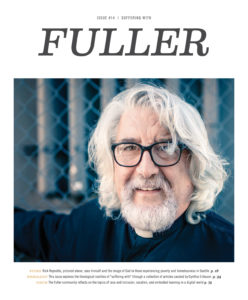
After the Lord had spoken these words to Job, he said to Eliphaz from Teman, “I’m angry at you and your two friends because you haven’t spoken about me correctly as did my servant Job. So now, take seven bulls and seven rams, go to my servant Job, and prepare an entirely burned offering for yourselves. Job my servant will pray for you, and I will act favorably by not making fools of you because you didn’t speak correctly, as did my servant Job.” (Job 42:7-8)
How exactly did Job speak correctly about God? Job does not stop at “the Lord gave, and the Lord has taken away; blessed be the name of the Lord” (Job 1:21) after his catastrophic misfortunes. While Christians often reference and even sing about this almost superhuman act of worshipful surrender (consider the popular worship song “Blessed Be Your Name”), it simply is not how the story actually goes. Job literally spends the next 34 chapters accusing God of injustice, seeking to take God to court, and calling for someone to vindicate him against God and his friends, who try to talk some sense into him (Job 3–37). Job’s friends reason with him that the Lord is the almighty, all-wise, all-just God and that Job’s righteousness does not stand a chance in the divine presence. Just confess that you are wrong, Job! In God’s holy presence, who can stand? All we can do is repent and obey! They sound God-inspired; their words could be set right next to the Psalms and we might not be able to even tell the difference. And yet Job defiantly protests that he knows what they know and he is not inferior to them
(Job 13:2).
Ultimately, after all of Job’s anger towards God, the Lord shows up and rebukes him, rendering him humbly silent. So the take-home lesson is that our human wisdom is limited, and we need to be humble and not imitate Job in speaking against God. Right?
If this is the conclusion to be drawn, the above verses from the book’s epilogue identifying Job, rather than Job’s friends, as speaking correctly about God are confusing. To make sure that we do not miss this point, it is repeated twice in two verses. Even with the divine rebuke, Job was correct, and Job’s friends were wrong. We know that Job’s friends were terrible comforters, engaging in theological discussion with Job instead of mourning with him. But that is not the critique God directs at them. God’s problem with them is that they misrepresented God; God is not how they described him to be. The book of Job has been used for theodicy, but this epilogue and God’s comments about Job and his friends point in a different direction. What is the book of Job really about?
Job addresses himself to an Almighty God with whom he can argue, be angry, and be disappointed. Job’s Lord is a covenantal God, a God who both condescends to us and raises us up so that together we can have a covenantal relationship. On the other hand, Job’s friends believed that God was merely interested in our subservience. This is the heart of God’s judgment upon Job’s friends. Job knew God, while they misunderstood him.
This idea of God’s people getting up in God’s face isn’t new, nor should it even be considered impious or disrespectful to God. God’s people are called Israel, which is an odd name. In Genesis 32, God condescends to wrestle with Jacob as he desperately pleads for divine blessing before reuniting with Esau, the brother whom he swindled years ago. Strangely, God comes in a form unable to overpower Jacob—so God cheats and dislocates his hip. Then, God gives Jacob a new name: Israel. “God-wrestler.” Why would God name God’s own people, “the ones who wrestle or struggle with God?” Why not “the obedient ones” or “God-followers”? Throughout the history of God’s people, those closest to God talked back to God like they were talking to a friend: sometimes pleading, sometimes bargaining, sometimes accusing and protesting. This is the kind of relationship that God wants. God desires the kind of people who wrestle and come near enough to get in God’s face, even while knowing that God is the Almighty.
A Genuine Covenant Interaction
In the history of doctrine, we see how a pious theology that radically centers God, while true and right, can be misconstrued and lead to unintended consequences. Swiss reformed theologian Karl Barth, in his critique and break from the liberal theology of his professors, zoomed in on the problem of anthropocentrism.1 The liberal theology of his time deceived itself into thinking that we can speak of God simply by speaking of humanity in a loud voice. This theological tradition emphasized humanity and its experience at the expense of God.2 To speak of it in Jewish philosopher Martin Buber’s categories of I and Thou, they made God into a simple reflection of ourselves (I and I). Other traditions have erred by making God an object for our management (I and it). But God must be Thou, a person who must be recognized as
wholly other.
Barth did not stop there. He realized that divine revelation does not allow us to ignore humanity at the expense of God either. Just as we cannot reduce God to an I or it, God does not desire to do that to us. God seeks an authentic I and Thou relationship, a genuine covenantal interaction with us. Later on, Barth would begin to talk about the “humanity” of God, meaning that our God revealed in Christ is a God of humanity. “In Jesus Christ there is no isolation of humanity from God and of God from humanity,” he said, and this is a result of God’s free and sovereign decision.3 As Christians, we do not know a God of theism, an abstract deity beyond human interaction, but rather the covenantal God who has elected to be with humanity from all eternity, a God
of humanity.
Exploring this idea of a “genuine covenant interaction” in the Psalms, Old Testament scholar Walter Brueggemann argues that in the absence of lament and protest like Job’s, God is only surrounded by “yes-men and women” who end up living a faith of “denial, cover-up, and pretense.”4 If God is everything and we are nothing, we can only become a “false self” with a “bad faith that is based in fear and guilt and lived out as resentful, or the self-deceptive works of righteousness.”5 Basically, we begin to lie to ourselves and externally profess one thing while ignoring the turmoil and conflict within. Speaking “Christianese,” we overspiritualize and point to the need to only trust and obey, to rejoice and be thankful in all things. To cover up whatever anger, pain, or disappointment that we have with God, we talk of how God will redeem all things and how God’s ways are mysterious. That is the cost of not knowing that God is a God that we can talk back to. God wants a true covenantal partner and not just a compliant servant.
Serve the Lord with all your heart and with all your soul?
A couple of years ago, a pastor friend of mine posted on his Facebook page that the most important thing as a Christian is to obey no matter what. Obedience or submission—are these the most important responses as Christians? Are these the only true offerings of relationship? According to Job’s friends, maybe. “God is everything, and we are nothing, mere worms” (Job 25:6). This view is quite popular. God is always right, and we are always wrong. While true in a sense, this is not the kind of faith God is after. We live as though the greatest commandment is to “serve the Lord with all your heart and with all your soul and with all your mind and with all your strength,” to “obey the Lord,” or to “worship the Lord.” However, that is not the greatest commandment. To love the Lord is not less than obedience or service, but rather more. We are called not just to action, but to desire, enjoyment, and delight. Love is actually above and beyond service, worship, obedience, and submission. These will not do for God. God wants it all; God wants love.
Danish philosopher and theologian Søren Kierkegaard muses upon the lengths to which God goes for this genuine covenant interaction in the Incarnation.6 Using the parable of a king who falls in love with a humble maiden, Kierkegaard tells a story of a God who actually wants love and not just the worshipful adoration that is the natural response to the infinite distinction between the partners. Therefore, God truly becomes humble in order to create the real possibility of self-disclosure and a genuine covenantal relationship of “equals.” The incarnation of God is that story, a pursuit of genuine covenantal interaction. This relationship is at the heart of who God is. That is why God judges Job’s friends for misrepresenting who God is and what God desires from us.
Repression, Pseudocommunity, and Xenophobia
As I mentioned, spiritualities that follow the sanctimonious path of Job’s friends abound, presented as maturity and faithfulness. Nevertheless, the critical factor in a genuine covenantal relationship is the possibility of protest and lament, of talking back and taking up space in the relationship. When we are not able to own and express our disappointment, frustration, and anger towards God, but instead repress them, a number of negative consequences occur, including distance from God. While he is speaking more generally, Canadian theologian Douglas John Hall’s insights about the impact of a society’s inability to acknowledge suffering serve as a guide to the dynamics that occur on three levels: personal, communal, and social.7
First, lack of lament towards God can result in the inability to accept and articulate personal suffering. Often, the repressed will use spiritual language, praising God and witnessing to God’s healing, all the while hiding the deep pain within. Just as Job’s friends believed, this repression is considered spiritual and pious as though it is what God wants.
Second, not only do we fail to process our own suffering, but we will fail to enter into the suffering of others. A lack of genuine covenantal interaction between us and God directly impacts the kind of communal life that we have together. If I repress my own suffering with the spiritual language of repentance, trying harder, or “blessing the name of the Lord,” then that is precisely the advice that I will give others as well. And when they fail to do so, I will judge them like Job’s friends judge Job. If we believe that our faith is about serving God no matter what, without doubt, faith struggles, or anger and disappointment, then we must all present a false self to each other as we do to God. In such a world there is no community, only a pseudocommunity where we hide behind our pious masks.
Third, according to Hall, this false self and a misunderstanding of self-denial leads us to search for an enemy whom we can blame for our troubles. Not being able to accurately locate the source of the pain, we project outwards and identify the demon elsewhere. It must be the wicked world that is at fault. Those strangers, weirdos, immoral and ungodly, making our lives worse, are hindering me from truly obeying and serving God as God desires. Our present national context of deep fractures and xenophobia, of zealous tribalism and willful ignorance of injustices, all so often in the name of God, points again to the problem of the self-delusion that Job’s friends preach.
An Asian American Witness
As an Asian American theologian, I often wonder what it means to listen to God in our place. What are the common errors (and rare wisdom) that can be found in the story of Asian America? I have found this truth about the importance of talking back to God to be one of the most profound theological lessons critical of my presumptions on God. Many Asian Americans have a cultural heritage of honor and respect for our elders. In some cases this heritage is a great treasure, while in others it creates a suffocating oppression. Either way, the idea of expressing anger and disappointment to God sounded shocking to me. Also, given all the pressures to be a “model minority,” succeeding in a White normative world, Asian Americans can feel like they should be law-abiding overachievers—not a very good context for lament or protest. Precisely for these reasons, when the importance of talking back finally sunk in as truth, I realized what kind of a god God is. Discovering that God, I changed.
We often think that the theological contributions of a particular context are limited to those insights given to us by our cultures or situations. However, this is a shallow understanding. Often the greatest theological contributions of our context come from the struggle with our context. Because status, relationship, and honor can matter so much in certain Asian American contexts, I have found this gospel according to Job to be my testimony as an Asian American theologian. We must realize “the infinite qualitative difference” between God and us. Only then does God’s monumental act of covenant seeking begin to become amazing grace and
good news.8
The story of Job teaches us that doubt, protest, and lament are all integral to biblical faith, even when they seem counter to much of our spiritual intuition or cultural narrative. At times, God invites us to “faithful” challenge and dissent. Of course, we shouldn’t do this flippantly. However, when life makes no sense, it’s important to know that God is bigger than our anger, disappointment, and doubt. We can talk back to God in an authentically I and Thou fashion. Though initially confusing within my Asian American context, ultimately it is redemptive and God-honoring to discover, paraphrasing Luther, that “the curses of God’s people can sound more pleasant in God’s ears than their hallelujahs.”9
ENDNOTES
-
Whatever Barth’s limitations in other areas, evangelical scholar Bernard Ramm notes that his contribution to dismantling classic liberal theology must be acknowledged, especially given that fundamentalist and evangelical scholars of his time could not do so. See B. Ramm, The Evangelical Heritage: A Study in Historical Theology (Grand Rapids, MI: Baker, 2000), 111.
-
Jürgen Moltmann discusses the error of affirming God at the expense of humanity in theism and having humanity at the expense of God in atheism, as opposed to a truly covenantal God revealed in Christ. See J. Moltmann, The Crucified God (Minneapolis: Fortress, 1993), 249–252.
-
K. Barth, The Humanity of God (Richmond, VA: John Knox), 46.
-
W. Brueggemann, The Psalms and the Life of Faith (Minneapolis: Fortress, 1995), 102.
-
Brueggemann, 103–104.
-
S. Kierkegaard, Philosophical Fragments/Johannes Climacus: Kierkegaard’s Writings, vol. 7 (Princeton: Princeton University Press, 1985), 26–35.
-
D. J. Hall, God and Suffering: An Exercise in the Theology of the Cross (Minneapolis: Augsburg, 1986), 43–46.
-
S. Kierkegaard, Practice in Christianity: Kierkegaard’s Writings, vol. 20 (Princeton: Princeton University, 1991), 140.
-
The original quote attributed to Martin Luther, but made popular by Dietrich Bonhoeffer’s reference, is, “The curse of the godless man can sound more pleasant in God’s ears than the hallelujah of the pious.”


